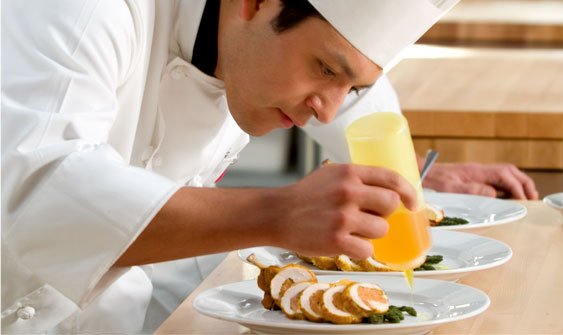Here are 10 tips to help you find the best culinary schools:
- Research accredited programs: Look for culinary schools that are accredited by a recognized accrediting body, such as the American Culinary Federation Education Foundation Accrediting Commission (ACFEFAC). Accreditation ensures that the school meets high standards for culinary education.
- Consider the program’s focus: Decide what type of culinary education you want and look for schools that offer programs in that area. For example, if you want to become a pastry chef, look for a school with a strong pastry program.
- Research the faculty: Look for schools with faculty members who are experienced chefs and have strong credentials in the culinary industry.
- Consider the school’s reputation: Look for schools with a good reputation in the culinary industry. You can ask other chefs or culinary professionals, or research online reviews and rankings of culinary schools.
- Consider the school’s location: Think about where you want to attend school and look for schools in that area. Some schools may offer internships or job placement assistance in the local area, which can be a valuable resource after graduation.
- Look for hands-on training: Culinary education is largely a hands-on field, so look for schools that offer plenty of opportunities for hands-on training in a professional kitchen setting.
- Consider the program length and cost: Culinary programs can vary in length, from short-term certificate programs to multi-year degree programs. Consider how much time you have to commit to your education and choose a program that fits your schedule. Also, consider the overall cost of the program, including tuition, fees, and any additional expenses such as textbooks or equipment.
- Research job placement and career support: Look for schools that offer job placement assistance or career support after graduation. This can be a valuable resource as you start your culinary career.
- Consider continuing education opportunities: The culinary industry is constantly evolving, so it’s important to choose a school that will provide ongoing support for your professional development. Look for a school that offers continuing education opportunities or support for obtaining additional certifications.
- Visit the school: If possible, schedule a visit to the school to get a feel for the facilities, meet with faculty and students, and ask any questions you may have. This can help you make an informed decision about which school is the best fit for you.
Nobody comes from their mother’s womb with a cooking degree in their little hands…you have to earn it from the culinary schools, where professional chefs are waiting to teach you the varied aspects of culinary field, down from the basic knife works to the delicious blending of varied food ingredients, the so many food-cooking ways, the mind-boggling thing about cooking temperatures and a delicious presentation. Now, if you are eager to explore the delicacies of commercial kitchens, then the following tips to find best culinary schools would certainly help you decide your alma mater.
Simple Tips On How To Find The Best Culinary Schools:–
1. Look For The Accreditation Flag Of American Culinary Foundation In Your Cooking School!
Only such culinary schools, which provide excellent cooking classes to their students, could get favored with the accreditation from American Culinary Foundation (ACF for short). No wonder, the culinary students have been suggested and even warned from time to time to receive their formal training through only the AFC accredited culinary schools.
In case, you could not get your hands on such AFC favored cooking programs, then make yourself happy with a regionally accredited culinary school (at least, ensure that your chosen school is in good grace of the US Department of Education).
2. The Older A Culinary School, The Better Would Be Its Reputation & Your Job Prospects!

The appealing thing about these old culinary schools is their classical grandeur and, more importantly, the “vast alumni network” that they gain over years of schooling. What I mean to say is that, if a culinary school has been founded 30 or 50 years ago, then we can expect it to have 100s of ex-students, who may probably be working as executive chefs (they do the hiring) at some 2, 3 or even 5 star hotels & restaurants. Now imagine your chance of getting employed by such executive or sous chefs!
And, oh, it’s also worth mentioning that the older culinary schools (like Le Cordon Bleu) have a better chance of being AFC accredited as compared to the new schools, which having just started may yet be unknown in most areas of the culinary industry.
3. Inquire About The Training Facility; See Whether It Has Up-to-date Kitchen Accessories!
The local eateries may not offer an array of modern kitchen utilities but the 5 star hotels certainly accommodate such luxuries, and thus, hoping that you will get to work in such big and modern kitchens, we recommend you to learn your culinary trade at such a school, which boasts of modern facilities. The downsides are the high cost of tuition that training at such schools with state-of-the-art culinary accessories will charge you and the fact that there’s no guarantee that you would end up working in such luxurious hotels (after all, the competition is high, and it takes experience to get ).
4. Look For Hands-on Instructions; Culinary Schools Offering Students-Operated Restaurants Are Awesome!
Being a practical profession, requiring deftness in knife skills and intuition to the use of different food ingredients, the expertise of the chefs and culinary artists are marked by the level of their experience in the kitchen. The more you play with the food ingredients and kitchen accessories, the better your skills would get.
No wonder, students choose to enroll themselves at such culinary schools, which offer impressive hands-on training programs, like maybe an internship, externship or an apprenticeship. Furthermore, we find the student-operated restaurants a real mark of academic excellence, since students enrolled in such facilitated schools will be subjected to the reality of culinary professions, the hustle bustles of a commercial kitchen and the time-restrain of preparing customer ordered food really quick. What better way to get trained than through hands-on practice at such real-life restaurants.
5. Check Out the Affordability Of the Culinary Training Program!
You might be thinking that a good culinary school will probably be costly. But, despite this popular belief, there are such culinary schools, which do provide excellent culinary training for a small cost, and the best thing is that they do have accreditation from ACF. Just go and check out the program cost of the community colleges, and you will discover for yourself how affordable they really are (just $1000 to $2000 for local students).
All the same, it would be bias of us not to disclose that out-of-state students generally have to incur a higher culinary program cost, not to mention that even the local students would be required to pay a fee as high as $38,000 to 45,000 when enrolling at the private schools or vocational culinary institutions (do try your luck for scholarship and financial aids!).
What’s more distressing is the fact that culinary artists have a really modest starting salary (just $8 to $12, gets better with field position and experience) which might not be good enough to pay back the student loans that they have taken for their professional schooling.
How long is culinary schools ?
The length of culinary school programs can vary significantly. Some programs may be as short as a few weeks or months, while others may be multi-year degree programs.
Here are some examples of the different types of culinary school programs and their length:
- Certificate programs: These programs are typically the shortest, lasting anywhere from a few weeks to a few months. Certificate programs typically focus on a specific area of culinary arts, such as pastry arts or culinary management.
- Associate’s degree programs: These programs typically last for two years and may include coursework in both culinary arts and business management. Associate’s degree programs may also include an internship component to provide hands-on experience in a professional kitchen setting.
- Bachelor’s degree programs: These programs typically last for four years and may include more in-depth coursework in culinary arts, as well as liberal arts and business courses. Bachelor’s degree programs may also include an internship component to provide hands-on experience in a professional kitchen setting.
- Master’s degree programs: These programs are typically the most advanced and may last for up to two years. Master’s degree programs may focus on specialized areas of culinary arts, such as culinary education or food science.
It is worth noting that the length of a culinary school program can depend on a variety of factors, including the type of program, the school’s curriculum and requirements, and the student’s pace of study. It is important to carefully research the programs you are considering and choose one that meets your education and career goals.
Culinary school essay sample
Here is a sample essay for a culinary school application:
“I have always been passionate about cooking and the culinary arts. From a young age, I spent hours in the kitchen with my grandmother, learning traditional recipes and techniques. As I grew older, my love for cooking only grew stronger, and I began to experiment with different flavors and ingredients.
In high school, I took every cooking and culinary class available to me and even started a catering business with some friends. This experience solidified my desire to pursue a career in the culinary arts and attend culinary school.
I believe that culinary school is the next step in my journey as a chef. I am eager to learn from experienced chefs and to develop my skills further. I am also excited to learn about the business side of the culinary industry, such as menu planning and kitchen management.
I am confident that with the education and training provided by culinary school, I will be able to achieve my goal of becoming a successful chef. I am ready to immerse myself in the culinary world and contribute my passion and skills to the industry. I am excited to apply to your culinary school and be a part of your program.”
Is culinary school worth it?
Whether culinary schools is worth it ultimately depends on your individual circumstances and goals. Here are a few things to consider when deciding whether culinary school is right for you:
- Cost: Culinary school can be expensive, and it’s important to consider whether you’ll be able to pay off any loans you take out to finance your education.
- Time commitment: Culinary school programs can vary in length, but many take at least two years to complete. This is a significant time commitment, and you should consider whether you’re willing and able to commit to this level of education.
- Career goals: If you’re interested in pursuing a career in the culinary arts, culinary school can provide you with the skills and knowledge you need to succeed. However, it’s important to keep in mind that a culinary degree is not a requirement for every culinary job, and there are other paths you can take to enter the field.
- Personal interest: If you have a strong passion for cooking and are interested in learning more about the culinary arts, culinary school may be a good fit for you. However, if you’re not sure that the culinary arts is the right career path for you, it may be worth exploring other options before committing to culinary school.
Ultimately, the decision to attend culinary schools is a personal one, and you should consider your own goals and circumstances before making a decision.
Where did Gordon Ramsay go to culinary school?
Gordon Ramsay attended North Oxfordshire Technical College, where he studied catering and hotel management. After completing his studies, he worked in a number of prestigious restaurants in France, including La Tante Claire, La Pétrus, and La Tante Claire, before returning to the UK to work at a number of restaurants, including Harveys. Ramsay has also received a number of accolades for his culinary skills, including three Michelin stars for his restaurant, Restaurant Gordon Ramsay, in Chelsea, London.
How to find Culinary high schools near me?
There are several ways you can find culinary high schools near you:
- Use an online search engine: Simply type “culinary high schools near me” into a search engine like Google and browse through the results to find schools in your area.
- Check with your local school district: Contact your local school district and ask if they have any culinary programs or schools in the area.
- Check with local vocational schools: Many vocational schools offer culinary programs and may be located near you.
- Ask for recommendations: Reach out to local chefs or culinary professionals and ask if they have any recommendations for culinary schools in your area.
- Check with local community colleges: Many community colleges offer culinary programs and may be located near you.
It’s a good idea to research each school carefully to make sure it meets your needs and goals before enrolling. You can also visit the school’s website or contact them directly for more information.
What are plant based culinary schools?
Plant-based culinary schools are educational institutions that teach students how to prepare and cook plant-based meals. These schools typically focus on vegetarian, vegan, and raw food diets, and may offer courses in plant-based cooking techniques, food preparation, and nutrition. Plant-based culinary schools may offer a variety of programs, including short courses, workshops, and full-time culinary programs. Some schools may also offer certification programs or degrees in plant-based culinary arts.
Plant-based culinary schools may be of interest to individuals who are interested in pursuing a career in plant-based cooking, or who simply want to learn more about plant-based cuisine for their own personal enjoyment. Many plant-based culinary schools also emphasize sustainability and environmental responsibility in their curricula, and may teach students about the environmental impacts of different types of food production and consumption.










